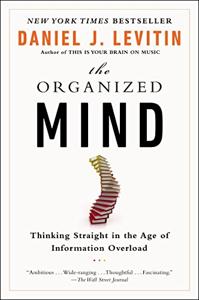
Want to learn the ideas in The Organized Mind better than ever? Read the world’s #1 book summary of The Organized Mind by Daniel J. Levitin here.
Read a brief 1-Page Summary or watch video summaries curated by our expert team. Note: this book guide is not affiliated with or endorsed by the publisher or author, and we always encourage you to purchase and read the full book.
Video Summaries of The Organized Mind
We’ve scoured the Internet for the very best videos on The Organized Mind, from high-quality videos summaries to interviews or commentary by Daniel J. Levitin.
1-Page Summary of The Organized Mind
Overview
Since How to Read a Book was first published in 1940, there have been many changes. For example, when you’re reading an essay or report now, you don’t actually see a blank sheet of paper; instead, the document is displayed on screen with a blinking cursor. However, this classic bestseller by Mortimer J Adler and Charles Van Doren has valuable advice that can help anyone read more effectively. It’s still relevant today because it teaches people how to take notes while reading and how to organize their thoughts after they’ve finished reading something.
Imagine that your brain is a house. It’s not a nice, new house; it’s an old and rickety one. Your brain isn’t tidy either – all kinds of information are stuffed into every nook and cranny in the place, just like junk in any other cluttered home. However, unlike when you’re trying to find something in your messy bedroom at home, this mess can actually hurt you. Sometimes the clutter gets so bad that it’s hard for us to do anything without getting distracted or forgetting what we were thinking about completely. We might even lose our keys! And because our brains aren’t always working properly, they don’t help us get things done efficiently either.
If you want to achieve your goals, then you need a well-organized mind. If you don’t have that, it’s impossible for them to come true. To understand why this is the case, we’ll look at how the brain works and how important organization is in achieving our goals.
Big Idea #1: The brain can only focus on so many things at once.
The brain has a system that organizes information. This system is called the attentional system, and it determines how your brain handles and organizes information.
The human brain evolved over thousands of years, and one of the most important parts is attention. Our brains are designed to focus on one thing at a time. This has been important for survival in the past – our ancestors would have had to focus all their attention on hunting because they could be distracted by something else (like another animal).
Today, we’re bombarded with too much information. We have to be able to process new facts and sights quickly, which puts a lot of stress on our attentional system. For example, while driving or listening to the radio, we might also need to think about an upcoming business meeting.
Here’s the important point: The brain can only focus on a limited amount of things at a time, and one way we can see it is that our brains are more interested in change than constants. It’s easy to show this in real life. Imagine you’re driving, and suddenly, you notice that the road feels bumpy. Before that moment, your brain wasn’t consciously thinking about how flat and smooth the street was! That isn’t useful information. It would be useful to think about the street if it suddenly felt bumpy because then you might be in danger or have popped a tire.
The point is, the brain doesn’t notice flat roads because they’re expected and harmless. Instead, it notices bumpy roads because they’re different and dangerous.
Big Idea #2: There’s a lot of information out there. Because of that, we have to make more decisions.
Decisions are an integral part of our lives. We have to make decisions about everything from what internet plan we should choose to whether or not we should respond to a text message. The key is that there’s too much information out there, so we’re constantly faced with more and more decisions.
Our brains are designed to process one idea at a time. Yet, in today’s world, we have unlimited access to information. So how do our brains cope with this? They focus on what matters most and ignore the rest. For example, if you’re looking for your dog Fifi when she runs off leash in a busy street, you’ll automatically filter out everything irrelevant around you—the people walking by or driving cars—and only notice things that are about knee-height and brown like your dog.





